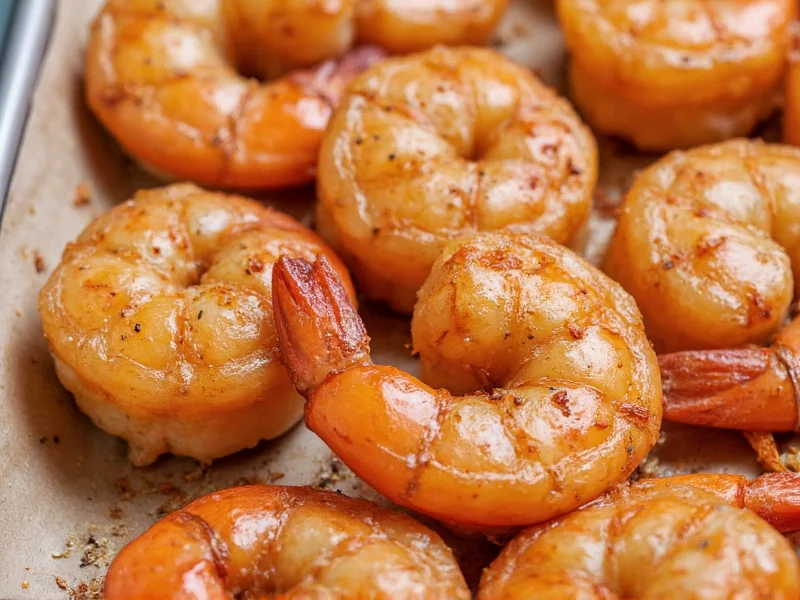The Science Behind Perfect Shrimp Seasoning
Shrimp's delicate texture and subtle sweetness require thoughtful seasoning approaches. Unlike beef or chicken, shrimp has less fat to carry flavors, making proper seasoning technique critical. The proteins in shrimp begin to denature when exposed to acid, which is why marinating times must be carefully controlled. A dry rub applied shortly before grilling delivers maximum flavor without compromising texture.
Essential Components of Effective Shrimp Seasoning
Creating balanced shrimp seasoning requires understanding four key flavor components:
| Component | Purpose | Best Options for Shrimp |
|---|---|---|
| Salt | Enhances natural flavors and helps form a crust | Kosher salt (1% of shrimp weight) |
| Aromatics | Adds depth and complexity | Garlic powder, onion powder, dried herbs |
| Heat Elements | Creates dimension without overwhelming | Smoked paprika, cayenne (use sparingly) |
| Acid | Brightens flavors (added after cooking) | Lemon or lime juice, vinegar-based finishing sauces |
Three Professional-Grade Shrimp Seasoning Blends
Classic Lemon-Garlic Blend
This versatile grilled shrimp dry rub seasoning works for most occasions. Combine for one pound of shrimp:
- 1 teaspoon kosher salt
- 1/2 teaspoon garlic powder
- 1/2 teaspoon onion powder
- 1/2 teaspoon dried parsley
- 1/4 teaspoon black pepper
- Zest of one lemon
- 1/4 teaspoon red pepper flakes (optional)
Apply 20 minutes before grilling. Finish with fresh lemon juice after cooking for bright flavor without texture issues.
Cajun-Style Spicy Blend
For those who enjoy bold flavors, this grilled shrimp Cajun seasoning creates a flavorful crust:
- 1 teaspoon kosher salt
- 1 teaspoon smoked paprika
- 1/2 teaspoon garlic powder
- 1/2 teaspoon onion powder
- 1/4 teaspoon cayenne pepper
- 1/4 teaspoon dried thyme
- 1/4 teaspoon dried oregano
- 1/4 teaspoon black pepper
Apply 15 minutes before grilling. The smoked paprika creates a beautiful color and prevents burning compared to regular paprika.
Mediterranean Herb Blend
This lighter grilled shrimp herb seasoning works well for summer meals:
- 1 teaspoon kosher salt
- 1 teaspoon dried oregano
- 1/2 teaspoon dried basil
- 1/2 teaspoon garlic powder
- 1/4 teaspoon lemon zest
- 1/4 teaspoon sumac (for tang)
- 1/4 teaspoon black pepper
Apply 30 minutes before grilling. The longer resting time allows the dried herbs to rehydrate slightly, improving flavor transfer.
Timing Matters: When to Season Grilled Shrimp
The timing of your seasoning application significantly affects results. Unlike chicken or steak, shrimp requires precise timing:
- Dry rubs: Apply 15-30 minutes before grilling. This allows salt to begin penetrating without drawing out too much moisture.
- Marinades with acid: Limit to 30 minutes maximum. Longer exposure to lemon juice or vinegar will start to "cook" the shrimp, resulting in a mealy texture.
- Oil-based marinades: Can go up to 1 hour, as oil doesn't denature proteins like acid does.
Always pat shrimp dry after seasoning to ensure proper searing on the grill. Excess moisture creates steam instead of the desirable caramelized crust.
Grilling Techniques That Maximize Seasoning Impact
Even the best grilled shrimp seasoning blend won't shine without proper grilling technique:
- Preheat your grill to medium-high (375-400°F) with clean grates
- Oil the grates with a high-smoke point oil using a grill brush
- Don't move shrimp for the first 1-2 minutes to allow proper searing
- Cook just until opaque (2-3 minutes per side for medium-large shrimp)
- Remove before fully cooked as carryover cooking will finish the process
For extra flavor, add wood chips like cedar or alder to your charcoal or gas grill. The subtle smoke complements most shrimp seasoning blends without overwhelming the delicate seafood.
Troubleshooting Common Shrimp Seasoning Problems
Even experienced cooks encounter issues with grilled shrimp. Here's how to fix common seasoning problems:
Seasoning Burns on the Grill
Sugars in some seasoning blends can burn at high temperatures. Prevent this by:
- Avoiding sugar-containing blends for direct grilling
- Using medium heat instead of high
- Applying seasoning after the first minute of grilling
Shrimp Becomes Too Salty
Shrimp readily absorbs salt. Fix this by:
- Reducing salt to 3/4 teaspoon per pound
- Using finishing salt after cooking instead of pre-seasoning
- Choosing sea salt instead of table salt (less dense)
Flavors Don't Penetrate
If your grilled shrimp seasoning isn't flavorful enough:
- Ensure you're using enough salt (it carries other flavors)
- Let dry rub sit 20-30 minutes before cooking
- Use garlic and onion powder instead of fresh (better adhesion)
- Lightly score larger shrimp to help seasoning penetrate











 浙公网安备
33010002000092号
浙公网安备
33010002000092号 浙B2-20120091-4
浙B2-20120091-4